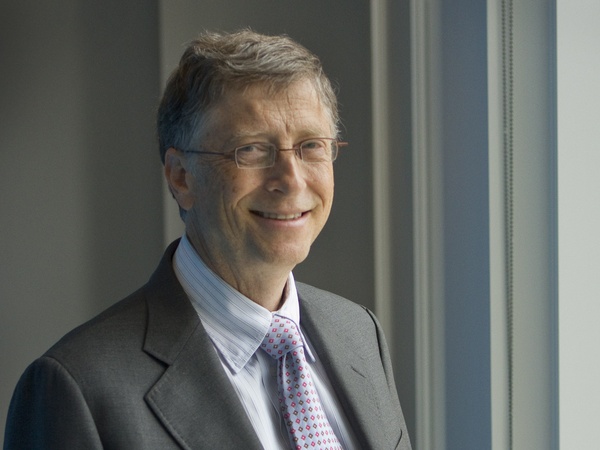Bill Gates Happy That Apple Pay Is Built On Open Standards
In an interview with Bloomberg, Bill Gates was asked what he thought about Apple Pay and its role in making payments easier for people:
“Well, Apple Pay's a great example of how a cell phone that identifies its user in a pretty strong way lets you make a transaction that should be very, very inexpensive. So the fact that in any application I can buy something, that's fantastic. The fact I don't need a physical card anymore, I just do that transaction and you're going to be quite sure about who it is on the other end, that is a real contribution."
Gates believes that while Apple will make mobile payments mainstream in some countries, it is not the one that will bring small transaction fees and high financial efficiency to the world's poorest nations. However, interoperability with other mobile payment systems will be necessary:
"The kind of basic things underneath aren't the things that Apple Pay was involved in. Apple Pay will take anybody they've signed up for the payment instrument. So they're not involved in driving the efficiency and the super, super low fees for low amounts of money. Now of course when we get these things as they branch out into other countries, having interoperability for people who happen to buy their devices will be worth doing."
Fortunately, Apple Pay is built on open standards such as NFC, the wireless technology making mobile payments possible at short distances, as well as token-based payments, another emerging industry standard. Token-based payment systems protect the privacy of a person making transactions with his/her credit card as well as the security of that credit card. (It should be much harder to steal credit cards when millions of them aren't stored in a single website's database but are instead tied to the owners' devices through unique identifiers.)
“All the platforms, whether it's Apple's or Google's or Microsoft, you'll see this payment capability get built in," added Gates. "That's built on industry standard protocols, NFC. And these companies have all participated in getting those going. Apple will help make sure it gets to critical mass for all the devices."
Google has tried for years to make NFC payments happen, but the process has been very slow. Some of the blame goes to the Android ecosystem not being as unified as the Apple ecosystem, which is controlled by a single company, while part of the blame goes to wireless carriers who have continued blocking Google Wallet until their Isis (now called "Softcard") mobile payments systems are ready.
Get Tom's Hardware's best news and in-depth reviews, straight to your inbox.
Google Wallet is, in fact, very similar to Apple Pay, although there are some differences. One is that you need a PIN to make the payment as opposed to simply putting your finger on a fingerprint scanner, and typing in a PIN actually takes more time than swiping a credit card.
Another difference is that Apple Pay doesn't store a user's payments other than the latest ones listed in Passbook, while Google Wallet can record the whole transaction history.
Microsoft doesn't have a competing solution right now, but Gates implied the company will eventually enter this space, too.
Follow us @tomshardware, on Facebook and on Google+.
Lucian Armasu is a Contributing Writer for Tom's Hardware US. He covers software news and the issues surrounding privacy and security.
-
turkey3_scratch Bill Gates is such a just guy, he really is a nice guy to complement one of his major competitive companies.Reply -
jkhoward I agree with you 100% turkey3_scratch.Reply
There was a AMA on Reddit for Bill Gates.
He is my all time personal role model. -
falchard I think the real surprise here is Apple supporting an open standard. I think Bill Gates has reached his life goal of opening Apple to an inclusive environment rather than an exclusive environment.Reply -
ZolaIII I hope they make new miracles fake dandruff cure so that he can bay it again & again using his iPhone.Reply -
maxwellmelon yep and the next step in the near future is a chip implanted in your forehead or arm mandated by the governments of the worldReply -
Li Ken-un ISIS is the real problem. BOO to ISIS! I hoep the carriers will be forced to keep their paws off iOS's Apple Pay the same way they can't install crapware on it.Reply -
JayriAvieock As long as your Android device has KitKat, NFC and a U.S. Sim card, you can use tap-and-pay on that phone.Reply -
alextheblue I'm not really interested in NFC payments, unless they can make them a whole lot more secure. Personally I'm glad credit cards with integrated security chips are finally being deployed in the US in the near future.Reply -
JayriAvieock Reply14308658 said:I'm not really interested in NFC payments, unless they can make them a whole lot more secure. Personally I'm glad credit cards with integrated security chips are finally being deployed in the US in the near future.
Google uses virtual prepaid Mastercard cards to pay for the transaction when you use tap and pay. so if the card number ever got stolen no more money can be taken out of said card number because it was only prepaid for the amount you paid for at the time of the transaction.
